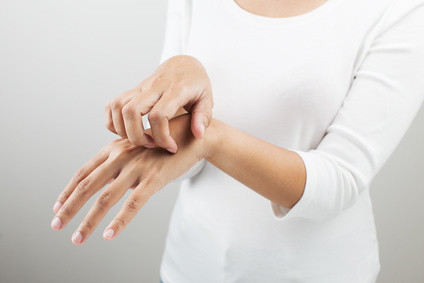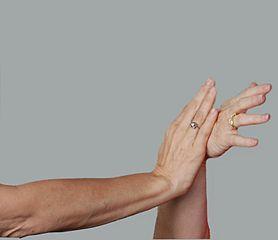Hand Cramps (Spasms) Causes and Symptoms
The hands are mainly made up of muscles, tendons and bones with numerous joints. Like any muscular part of the body, cramps can occur and is often painful. With our hands being one of the most active parts of our body, cramping due to strain is not uncommon. However, sometimes cramps occur for other reasons even when we do not use our hands excessively.
What are hand cramps?
Hand cramps are muscle spasms that occur in the hands. Spasms are when muscles contract suddenly and forcefully. This causes discomfort and pain. The spasm may also feel harder than the surrounding muscle tissue. Muscle cramps or spasms are also sometimes referred to as “charley horses” although this term is used more frequently for leg cramps.
Cramps can occur anywhere along the arms. Often the term hand cramps may also involve muscle spasm in the forearm, where most of the muscles that control the hand is located. The muscles within the hands are responsible for finger movement and can also cramp. Most of the time cramping is short lived but sometimes cramps can be repetitive or prolonged.

Symptoms of Hand Cramps
Hand cramps are usually accompanied by other symptoms like:
- Hand pain
- Restricted hand movement
- Hand weakness
Redness and swelling may occur at times, particularly if there is injury or inflammation to the area. Sometimes cramping can be so severe that it may cause deformity of the hand or arm. Usually this is temporary.
Causes of Hand Cramps
When assessing the cause of hand craps, it is important to note whether cramps is isolated to one hand, involves both hands and other parts of the arm or if it is also occurring elsewhere in the body at the same time. Some of the causes of hand cramps are not isolated to the hand only. However, most cases of hand cramps are due to upper arm overuse, injury or strain.

Overuse and Strain
As with any part of the body, overuse can lead to disturbances. The hands are particularly prone to overuse in daily life. It is further compounded in the modern era with the continuous use of electronic devices like mobile phones. Strain due to overuse tends to occur with prolonged activities.
Read more on texting thumb.
Muscle strain does not only occur with overuse but also when excessive force has to be generated by the hand muscles. This can also arise from repetitive stress injuries and is more likely to be seen in certain occupations where the same action has to be performed repeatedly.
Hand Injury
Injury can arise through various means. With the hands touching a host of objects and substances as well as being involved in many different types of activities, it is to some extent more prone to injury than other parts of the body. Muscles can cramp in response to trauma.
This may include blows to the muscle and penetrating injuries, as well as muscle strain that may arise with sudden force on the tendons and muscles. For example, a person may grab hold of a fixed object as they are falling which can then strain and injure the muscles and tendons of the hand.
Dehydration
The excessive loss of water and electrolytes from the body can disturb muscle activity and even result in cramps. This is due to an imbalance of certain minerals like potassium and calcium which are needed for nerve conduction and muscle activity. Muscles may cramp spontaneously or arise after even minimal activity of the affected part, like the hand.
Dehydration occurs for several possible reasons. Insufficient consumption of water and poor nutrition may result in mild dehydration. However, most of the time dehydration is associated with:
- Severe diarrhea
- Profuse vomiting
- Excessive sweating
- Inadequate hydration, particularly during strenuous physical activity or in hot conditions.
Carpal Tunnel Syndrome
In carpal tunnel syndrome (CTS), a nerve supplying the hands and fingers may become compressed in the bony tunnel within the wrist (carpal tunnel). This occurs with overuse of the hands which strains the muscles of the forearm and causes the tendons to swell. These swollen tendons the press on the median nerve that travels with the tendons through the carpal tunnel.
Tingling, numbness, pain and weakness of the hand are the characteristic symptoms of carpal tunnel syndrome. However, hand cramps may occur. This may not be directly related to compression of the median nerve. Rather it arises with overuse of the hand muscles. There hand cramps may occur at the same time as other symptoms of carpal tunnel syndrome.
Writer’s Cramp
Writer’s cramp, a condition also known as mogigraphia, is where the muscle tone in the hands is abnormal. This is condition that tends to arise with excessive activity of the hands over long periods of time (months or years). While it tends to occur more frequently with excessive writing or typing, it can also arise with prolonged playing of musical instruments or any other repetitive hand activity.
Due to the type of activity and its effect on specific muscles and nerves of the hand, the muscles go into spasm and the normal muscle tone is also lost. In writer’s cramp, the coordination of the hand particularly for specific activities is affected. It can even result in deformity of the hand or fingers as the opposing muscles cause the hand to be “pulled” into abnormal positions.
Carpopedal Spasm
Carpopedal spasm is muscle cramps that occur in the hands and feet. Usually these are painful cramps and may also involve the wrist and ankles. Carpopedal spasms may be associated with:
- Hypothyroidism which is low thyroid hormone levels usually due to an underactive thyroid gland.
- Hypocalcemia which is low calcium levels in the blood that occurs for several different reasons.
- Hyperventilation which is abnormally rapid and deep breathing that can suddenly affect calcium levels in the bloodstream.
- Tetanus which is an infection by the tetanus bacteria which releases a powerful toxin.
It is important to note that the cramps may at times affect the hands only (carpal spasms) or the legs only (pedal spasms).
References:
- Question about hand cramps. Harvard Health
- Carpopedal spasm. Health Line





